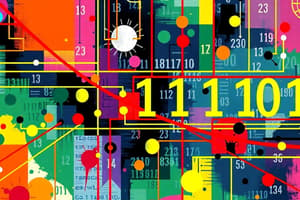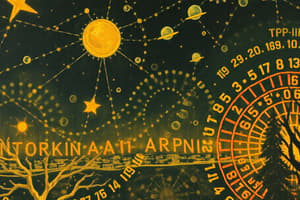Podcast
Questions and Answers
What does the term 'Internet' signify?
What does the term 'Internet' signify?
- A network of networks (correct)
- A large database system
- A software application
- A centralized server model
What significant event occurred in 1991 regarding the Internet?
What significant event occurred in 1991 regarding the Internet?
- The first web browser was developed
- The concept of equal participation was established
- The US government allowed business agencies to connect to the Internet (correct)
- The first free net was created
Which agency initiated the experimental computer network in 1969?
Which agency initiated the experimental computer network in 1969?
- IBM
- NIST
- NASA
- ARPA (correct)
What is one characteristic of the initial design of the Internet?
What is one characteristic of the initial design of the Internet?
Who is recognized as one of the 'fathers of the Internet'?
Who is recognized as one of the 'fathers of the Internet'?
What is a server in the context of the Internet?
What is a server in the context of the Internet?
In what year did the word 'Internet' start being used?
In what year did the word 'Internet' start being used?
What was one of the impacts of the Internet on society?
What was one of the impacts of the Internet on society?
What is the main feature that differentiates Web 2.0 from Web 1.0?
What is the main feature that differentiates Web 2.0 from Web 1.0?
What term describes a collection of linked Web pages with a common theme?
What term describes a collection of linked Web pages with a common theme?
Which of the following best describes the purpose of the World Wide Web?
Which of the following best describes the purpose of the World Wide Web?
Who is known as the inventor of the World Wide Web?
Who is known as the inventor of the World Wide Web?
What describes the type of web in Web 1.0?
What describes the type of web in Web 1.0?
What does a dynamic page allow users to do?
What does a dynamic page allow users to do?
What best represents a disadvantage of Web 1.0?
What best represents a disadvantage of Web 1.0?
What is a key element of web pages in Web 2.0?
What is a key element of web pages in Web 2.0?
What characterizes Web 2.0 as opposed to earlier web generations?
What characterizes Web 2.0 as opposed to earlier web generations?
How does a dynamic page function in Web 2.0?
How does a dynamic page function in Web 2.0?
Which of the following is an example of a social networking site?
Which of the following is an example of a social networking site?
What is the primary purpose of blogs in the context of Web 2.0?
What is the primary purpose of blogs in the context of Web 2.0?
What defines a wiki in the context of collaborative online editing?
What defines a wiki in the context of collaborative online editing?
Which of the following statements about Web 2.0 is true?
Which of the following statements about Web 2.0 is true?
Which function is NOT typically associated with social networking sites?
Which function is NOT typically associated with social networking sites?
In what order are blog posts typically displayed on a blogging site?
In what order are blog posts typically displayed on a blogging site?
What is the primary purpose of a portfolio website?
What is the primary purpose of a portfolio website?
Which of the following features is most characteristic of a media website?
Which of the following features is most characteristic of a media website?
A brochure website is typically used by which type of organization?
A brochure website is typically used by which type of organization?
What is the main goal of an educational website?
What is the main goal of an educational website?
How do infopreneur websites differ from traditional eCommerce sites?
How do infopreneur websites differ from traditional eCommerce sites?
What defines a personal website?
What defines a personal website?
Which type of website would primarily be used by a nonprofit organization?
Which type of website would primarily be used by a nonprofit organization?
What is a key characteristic of a media website compared to other types of websites?
What is a key characteristic of a media website compared to other types of websites?
What is the primary function of a URL?
What is the primary function of a URL?
Which of the following describes HTTP?
Which of the following describes HTTP?
How does encryption function in data transmission?
How does encryption function in data transmission?
What is the role of a router in a network?
What is the role of a router in a network?
What type of content can HTML be used to structure on a web page?
What type of content can HTML be used to structure on a web page?
What defines social media platforms?
What defines social media platforms?
What is the definition of a web bot?
What is the definition of a web bot?
What is a common use of online gaming?
What is a common use of online gaming?
Flashcards are hidden until you start studying
Study Notes
Internet History
- The internet is a global network of computers, connecting billions of users worldwide.
- The origins of the internet can be traced back to ARPA (Advanced Research Projects Agency), which established an experimental computer network in 1969.
- The network was designed with redundancy in mind, ensuring that even with the loss of some nodes, the network would remain functional.
- The term "internet" emerged in 1982.
- In 1986, the first "free net" was established at Case Western Reserve University.
- In 1991, the US government opened the internet to businesses.
- Vinton Gray Cerf, known as one of the "fathers of the Internet," played a major role in developing the TCP/IP protocol along with Bob Kahn.
Major Components of the Internet
- The internet has numerous components:
- Servers: Software that delivers services to another computer.
- Web: A vast collection of connected webpages accessible through web browsers.
- Email: A common online communication method for sending and receiving messages.
- Social Media: Platforms for sharing content, including comments, photos, and videos.
- Online Gaming: Platforms for playing games online.
- Software Updates: Applications and operating system updates can be downloaded from the internet.
- HTML (Hypertext Markup Language): A coding language for webpages that defines how text, images, multimedia, and links are displayed.
Internet Terms and Definitions
- URL (Uniform Resource Locator): A web address used to access a specific resource online.
- Bit: A single digit in the binary system (0 or 1).
- Byte: A unit of data typically composed of 8 bits.
- Upload: To transfer data from your computer to another computer.
- Download: To transfer data from another computer to your computer.
- HTTP (Hypertext Transfer Protocol): The standard communication protocol for web pages.
- HTTPS (Hypertext Transfer Protocol Secure): An encrypted version of HTTP, protecting personal information and passwords.
- Router: A device that manages network traffic between your home or business and the Internet Service Provider (ISP).
- Encryption: A method of scrambling data to make it unreadable to unauthorized individuals.
- Web Bot: Programs or applets designed to perform repetitive tasks on the internet, such as posting messages or searching for information.
- Search Engine: Software like Google and Yahoo that allows web users to find information using keywords or phrases.
Introduction to Networks: The Web
- The Web (World Wide Web) is a collection of interconnected web pages containing text and graphics.
- These web pages are connected through hyperlinks, highlighted keywords, and images that lead to related content.
- A group of related web pages with a common theme forms a website.
- The primary page on a website that acts as a central point of access is the home page.
- Tim Berners-Lee, an English engineer and computer scientist, is recognized as the inventor of the World Wide Web.
Web 1.0 (Read Only Static Web)
- The first generation of the web, characterized by its static and read-only nature.
- Users could primarily access information, but interaction was limited.
- Content was mainly organized into directories and focused on company home pages.
Web 2.0 (Read-write Interactive Web)
- A newer generation of web services and applications with a strong emphasis on collaboration, user-generated content, and interactivity.
- Users are not just consumers of information but also active participants in creating and sharing content.
- Dynamic pages allow user interaction, enabling features like commenting and user account creation.
Example of Web 2.0 Applications:
- Social Networking: Websites and apps that connect users, facilitating communication and sharing.
- Blogs: Online journals or diaries where users share their thoughts, ideas, and experiences.
- Wikis: Collaborative websites that allow users to edit and manage content together.
Types of Websites
- Portfolio Websites: Websites showcase examples of prior work, particularly useful for service providers to demonstrate their skills to potential clients.
- Media Websites: Websites that focus on news stories, reports, and other media content.
- Brochure Websites: Simple websites providing basic information about a business, including contact details.
- Nonprofit Websites: Websites that focus on promoting the mission of a non-profit organization and facilitating donations.
- Educational Websites: Websites associated with educational institutions, providing educational materials or information about the institution.
- Infopreneur Websites: Websites dedicated to creating and selling information products (e.g., courses, tutorials, eBooks).
- Personal Websites: Websites that express personal thoughts, ideas, and experiences, including blogs and photo diaries.
Studying That Suits You
Use AI to generate personalized quizzes and flashcards to suit your learning preferences.




